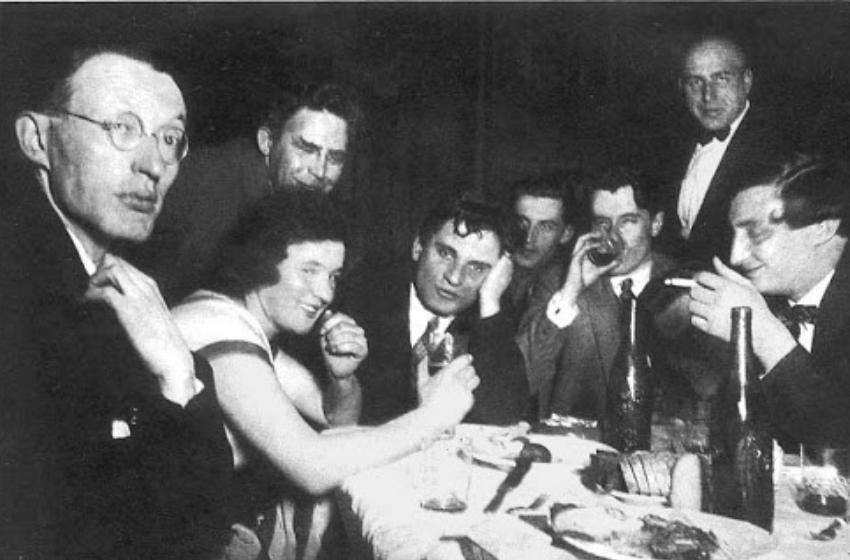Yuri Olesha is a very controversial and tragic figure in literature. Although the first books written and lifted him to the top of the literary Olympus, this was followed by an unexpected silence, the reasons for which are still debated. What happened, why was such a gifted writer literally pushed to the literary margins and poverty and alcoholism became his lot?
Yuri Olesha was born in Elizavetgrad, Ukraine, into a middle-class family. His father, Karl Antonovich, was an excise officer, an impoverished member of the gentry. In 1902, the family moved to the cosmopolitan port of Odessa, where Karl Antonovich was employed as as a tax inspector in a vodka distillery.
Almost all of Olesha's childhood and early youth are associated with Odessa. Here he became close friends with many future celebrities - Bagritsky, Kataev, Ilf, Petrov, and their fates were closely intertwined in the future ... Young, cheerful, carefree, full of ambitions, they accepted the revolution that had happened with enthusiasm, as the beginning of a new life. And although Olesha's parents (and they were of noble origin and came from Poland) decided to emigrate, 23-year-old Olesha did not go with them, although he was very upset about separation. But in Odessa he still had friends and, of course, love.
And his love was Seraphima Suok, the youngest of the three daughters of an Austrian émigré who lived nearby. With this love Yuri completely lost his head.

The elder Lydia was strict and serious. Olga was the middle sister, the most beautiful and dreamy. Sima was the youngest: light, funny and careless.
At the time of his acquaintance, Yuri Olesha was 20 years old and was fascinated by 16-year-old Sima Suok. She enthusiastically and favourably accepted his courtship. They wandered around Odessa, constantly kissing right in the middle of the street. Ahead was a whole life full of joy, hopes, plans.
"My friend ..." - so he affectionately called his Sima (Seraphima). Valentin Kataev wrote:
"Not tied to each other by any obligations, beggars, young, often hungry, cheerful, tender, they were able to suddenly kiss in broad daylight right on the street, among revolutionary posters and lists of the executed."
Soon Kataev persuaded this cheerful and friendly Odessa company to move to Kharkov. The time was hard and hungry. Friends Yuri Olesha and Valentin Kataev had to live on odd jobs, composing epigrams or toasts for feasts to order, which, however, was very easy for them. And they lived, though poor, but merrily and happily. But here for the first time the inconstancy and "frivolity" inherent in Seraphima appeared.

Photo: www.e-reading.club
Once, being hungry, friends, for a joke, decided to have dinner at someone else's expense. Knowing that a rather wealthy accountant named Mac was in love with Sima, they showed up with the whole company to visit him. And there, over a delicious dinner and talking about art, they did not notice the disappearance of the owner of the apartment and Sima. And when this couple returned, Sima announced to her friends that she and Mac were married, and now she will live in prosperity. At that time, it was really possible to sign or divorce in just a few minutes.
It is impossible to describe what Olesha experienced then. With grief, he drank. Seeing what was happening with his friend, Kataev went to the accountant and returned Sima home. She didn't particularly resist it. Olesha's happiness knew no bounds: his little friend was with him again, chirping, kissing him. If they remembered the story with Mac, it was only for the sake of a joke.
But, alas, the newfound happiness turned out to be short-lived, and was destroyed by Vladimir Narbut, who appeared in Kharkov, lame and one-armed, but, nevertheless, very brutal. He was a fairly well-known writer, one of the representatives of Acmeism, along with Akhmatova, Gumilev, Mandelstam. Only a few months have passed, and Serafima Suok has already become the wife of the poet Vladimir Narbut and left with him for Moscow.
Olesha again managed to return Sima, but before they had time to enjoy each other's company, Narbut rushed in with burning eyes, holding a Mauser in his hand.
"If Seraphima does not appear this very minute, then I will shoot myself!"
Sima did not tempt fate and left, this time forever. And, it seems, she was still happy with him, since she did not run to anyone else. While Narbut was alive.

Soon from Kharkov the whole company - Kataev, Sima with Narbut, Olesha and others - went to Moscow. Olesha outwardly looked rather calm, but, exhausted by his love experiences, he was very thin and aged.
There they got a job in the editorial office of the newspaper "Gudok", published for railway workers. Soon Olesha, who was given the pseudonym Zubilo, became one of the best feuilletonists there, his materials were published in every issue, the readers were looking forward to them with impatience and interest. And Olesha wrote these feuilletons very easily.

Right: The portrait of Yuri Olesha
“By a strange coincidence, a company of young writers gathered in "Gudok", who later became, I dare say, famous writers, authors of such works as "The White Guard", "Days of the Turbins", "Three Fat Men", "Envy", "The Twelve chairs", "Fatal eggs", "The Diaboliad", "The Master and Margarita" and many, many others. These books were written in the evenings and at night, while during the day their authors sat at their desks in the editorial room and quickly scribbled articles, notes, small feuilletons, poems, political pamphlets on strips of newspaper breaks, processed the reader's letters and, finally, made up the accounts. for the work done. The little key earned more than all of us"
Valentin Kataev
"Gudok's" management appreciated Olesha very much. He was especially indispensable at the time of the subscription campaign. In one of the most comfortable carriages, the invaluable employee was taken to major railway stations for performances. And there, after the introductory speech, he demonstrated to the stunned spectators his gift of improvisation - using a list of rhymes offered to him from the audience (the number of rhymes could reach two hundred), Olesha immediately began to give out the verse he had invented (burime) on the fly. Needless to say, after such speeches of his, the number of subscribers to "Gudok" increased sharply.
Nevertheless, Olesha managed to overcome his tormenting passion for Simochka. And the middle sister of Suok, Olga, helped him in this. Once, being next to her, he shared his experiences with her, and then asked:
"Could you treat me like that ?!"
"No, perhaps…"
"Then marry me!"
Soon Olga moved to Moscow and they got married.

Working in "Gudok", Olesha wrote feuilletons during the day, and at night he composed his first serious work - the novel "Envy". The work progressed very slowly. At times he would spend an agonizingly long time picking up one single phrase.
“I have in my folders at least three hundred pages marked with the number “1â€. These are the three hundred beginnings of Envy. And none of these pages was the final beginning."
The famous tale "Three Fat Men" was written ... almost for a joke. Often visiting Kataev, Olesha drew attention to a neighbour's girl reading a book. They met, a charming 13-year-old girl's name was Valya Grunzaid, and the book turned out to be Anderson's Tales. Then Olesha promised the young lover of fairy tales to write a fairy tale no worse than Anderson's. And immediately with great enthusiasm he set to work - he began to write "Three Fat Men".
Then Olesha lived in one of the rooms in the building of the printing house. “Those were merry times! There was a huge roll of newsprint next to my bunk. I tore off a large sheet of paper and wrote with a pencil "Three Fat Men" After 8 months, the promised fairy tale was ready.
This fantasy tale follows the thrilling adventure of Suok and her friends, filled with sophisticated metaphors. Although the book was completed in 1924, the first edition of "Three Fat Men" came out only four years later, with excellent illustrations by Mstislav Dobuzhinsky.


After that, Yuri Olesha did not write anything more important. This period of his life was described as "The surrender and death of a Soviet intellectual."
What happened and what prevented him from writing? In his diary, he writes: “Literature ended in 1931. I am addicted to alcohol..". Olesha hated socialist realism. At the peak of Stalin's purges, in 1937, Olesha was accused of "antihumanism".
Retaliation followed: a ban was imposed not only on the publication of his works, but even on the mention of his name in literary circles, which lasted twenty years. Pasternak and Olesha were mentioned among those intellectuals who were allegedly plotting a political diversion.
It was then that Olesha fell silent. He stifled his resentment and mental pain with a drink, becoming a regular at the National restaurant. He often did not have money, but many treated him. And he entertained himself and those around him with jokes. So, one day, leaving a restaurant, he turned to a man in uniform, whom he took for a doorman:
"Doorman, taxi"
"I am not a doorman, I am an admiral"
"Then the submarine, please"
Olesha said about himself: “I have never been an alcoholic. I drank not out of love for drinking, for snacking, for quacking, but I drank because I did not know what to do in between."

During World War II, Olesha was evacuated with the Odessa Film Studio to Ashkhabad in Turkmenistan. After the war he returned to Moscow, where he constantly moved with his wife from one small apartment to another. In 1954, they were given an apartment in the writer's building on Lavrushinsky Lane. Olesha's only noteworthy theatre piece during his later years was an adaptation of Dostoevskii's The Idiot for the Vakhtangov Theatre. Other works included a stage adaptation of Chekhov's 'Tsvety Zapozdalye' (1959), which was made into a movie in 1970, and a screenplay for a children's cartoon, entitled A Girl in the Circus.
Olesha died of a heart attack on May 10, 1960. He was married to Olga Suok. Their stepson Igor, committed suicide by jumping out of a window in front of both Olesha and Olga.
Anyhow, he is considered one of the greatest Russian novelists of the 20th century, one of the few to have succeeded in writing works of lasting artistic value despite the stifling censorship of the era. His works are delicate balancing acts that superficially send pro-Communist messages but reveal far greater subtlety and richness upon a deeper reading.






















